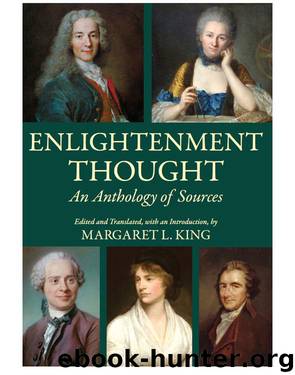Enlightenment Thought by King Margaret L.;

Author:King, Margaret L.;
Language: eng
Format: epub
Publisher: Hackett Publishing Company, Incorporated
Published: 2018-01-07T16:00:00+00:00
{140} Complete freedom of trade must be ensured
François Quesnay, General Maxims for the Economic Management of an Agricultural Kingdom (1758)
Quesnay’s thirty “general maxims,” or “guiding principles,” of which fifteen are excerpted here, are a concise summary of the physiocratic economic program. They offer direction, to continue with the wording of his title, “for the economic management of an agricultural kingdom”: implicit here are the notions that the economy will be primarily agricultural, as was that of the kingdom of France (of whose king Quesnay was a personal dependent), and that it will be actively managed by a monarch concerned to advance the prosperity of the nation.4
Modern readers may be surprised that Quesnay advocates both monarchical rule, as stated in maxim 1, and economic freedom, as seen in maxims 3–5, 13, 18, and 25. They will recognize the discussion of such matters as taxation, infrastructure, demographic pressure, and regulation; see maxims 3, 5, 17–20, and 26. Above all, Quesnay argues that land, not industry, is the sole source of wealth; see especially maxims 1, 3, and 12–15.
General Maxims
1. There must be one sovereign authority superior to all the individual members of the society and to all the wrongful interventions of particular interests: for the object of domination on the one hand, and obedience on the other, is the security and lawful interests of all. The system of countervailing forces in a government5 is a disastrous notion that can only lead to discord among the elite and the oppression of the humble. The division of societies into different ranks of citizens, such that some exercise sovereign authority over the others, detracts from the general interest of the nation and promotes dissension among the competing interests of different groups of citizens. Such division would disrupt the administration of an agricultural kingdom which must unite all interests in the service of one overriding objective—that is, to the prosperity of the agricultural sector, which is the source of all the wealth of the nation and that of all its citizens.
. . .
{141} 3. The sovereign and the nation must never forget that the land is the one and only source of wealth, and that it is agriculture that multiplies it. For as wealth increases, so does population. Population and wealth together cause agriculture to prosper, invigorate trade, and animate industry, thus augmenting and perpetuating wealth. On this abundancy depends the success of all aspects of the administration of the kingdom.
4. The possession of property both immovable, i.e., land, and movable must be guaranteed to those who are the legitimate owners; because the security of property is the essential foundation of the economic order of a society. Without this security of ownership, the land would remain uncultivated. No proprietors or farmers would be willing to invest the sums necessary to cultivate the land and increase its value if the ownership of the land and its products were not guaranteed them. It is the assurance of permanent possession that inspires the willingness to labor and to employ wealth for the improvement of agriculture as well as commercial and industrial enterprises.
Download
This site does not store any files on its server. We only index and link to content provided by other sites. Please contact the content providers to delete copyright contents if any and email us, we'll remove relevant links or contents immediately.
| Africa | Americas |
| Arctic & Antarctica | Asia |
| Australia & Oceania | Europe |
| Middle East | Russia |
| United States | World |
| Ancient Civilizations | Military |
| Historical Study & Educational Resources |
In Cold Blood by Truman Capote(3368)
The Innovators: How a Group of Hackers, Geniuses, and Geeks Created the Digital Revolution by Walter Isaacson(3121)
Steve Jobs by Walter Isaacson(2883)
All the President's Men by Carl Bernstein & Bob Woodward(2361)
Lonely Planet New York City by Lonely Planet(2206)
And the Band Played On by Randy Shilts(2183)
The Room Where It Happened by John Bolton;(2143)
The Poisoner's Handbook by Deborah Blum(2126)
The Innovators by Walter Isaacson(2096)
The Murder of Marilyn Monroe by Jay Margolis(2089)
Lincoln by David Herbert Donald(1979)
A Colony in a Nation by Chris Hayes(1915)
Being George Washington by Beck Glenn(1881)
Under the Banner of Heaven: A Story of Violent Faith by Jon Krakauer(1787)
Amelia Earhart by Doris L. Rich(1684)
The Unsettlers by Mark Sundeen(1679)
Dirt by Bill Buford(1665)
Birdmen by Lawrence Goldstone(1656)
Zeitoun by Dave Eggers(1636)
